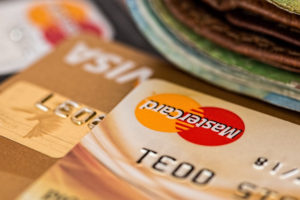Many financial experts don’t really like credit cards because of how many people suffer from credit card debt. However, it can be a beneficial tool if used properly, especially for anyone desiring to increase their credit score. A high credit score will allow you to buy a home, settle in a location and continue working on your dreams next to your babies. When you’re figuring out how you feel about them, consider these top tips for every first-time credit card holder.
1. Only Use 10% of the Balance
 Using a credit card is a big deal and shouldn’t be taken lightly. You need to look at it as both a privilege and a responsibility. When it comes to credit cards, a lot of people struggle because they look at credit cards as free money. When you get to the cash register, all you need to do is swipe. As a result, you don’t feel the immediate impact of losing money. Don’t swipe until there’s no more credit left on the card. Stop at 10%. It’s an easier amount to pay off and you’ll be less likely to get yourself in a financial abyss.
Using a credit card is a big deal and shouldn’t be taken lightly. You need to look at it as both a privilege and a responsibility. When it comes to credit cards, a lot of people struggle because they look at credit cards as free money. When you get to the cash register, all you need to do is swipe. As a result, you don’t feel the immediate impact of losing money. Don’t swipe until there’s no more credit left on the card. Stop at 10%. It’s an easier amount to pay off and you’ll be less likely to get yourself in a financial abyss.
The folks at General Electric Credit Union say “Student loans and credit cards can help you build good credit — as long as you stay current on monthly payments and don’t overuse your cards. Your credit score, which shows how responsible you are with credit, is an important factor that lenders check before approving car loans and mortgages. The better your score, the lower the interest rate you may be eligible for.”
2. Pay Off the Balance Immediately
Credit cards have their advantages which include the point systems and the opportunity to build a great credit score. In order to keep this up, you’ll need to keep the money to the side and pay off the balance when it’s due. Don’t swipe the card knowing that you don’t have the money to cover the expenses. Most people do this and that’s why they experience serious credit card debt.
3. Use It in Dire Emergencies and Necessities
First, you’ve got to sit down and decide what your necessities are. For many people, necessities include groceries, gas and utility bills. If those don’t go over the 10% limit of your credit card, pay for them using the card and pay the card off at the due date. These are things you have to buy anyway. This is why it’s great to put them on a card and pay it off each month. You should already have an emergency fund so don’t think of the credit card as that. However, if someone passes away suddenly and you need to book a flight, this is an expense you can place on your credit card. Just make sure to pay it off on time.
4. Take Advantage of Points
Once you’re really good with handling your credit card account, creditors see this and your FICO scores eventually go up. As they rise, you’re able to get better credit cards with better perks such as airline miles and dollars for cruises. Don’t miss out on the discounts you could also receive.
With each point, it’s still really important to remember to handle credit or it will handle you. As you grow your financial muscles, you’ll be able to see and think more clearly. The more clear your mind stays, the more you’ll be able to make good and sound decisions when it comes to money and your first credit card!

